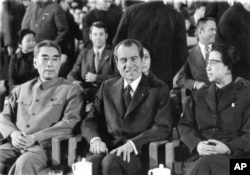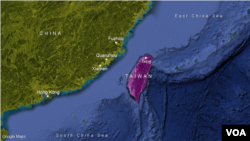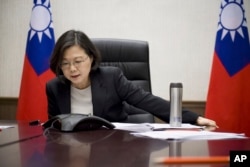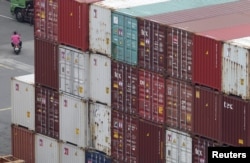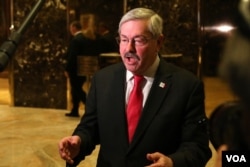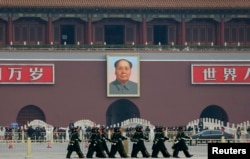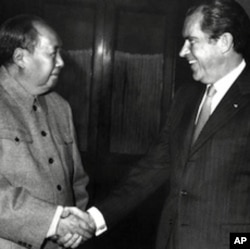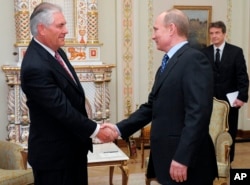President-elect Donald Trump’s suggestion that the United States doesn’t necessarily need to be bound by a “One China” policy, which was key to the establishment of diplomatic ties between Washington and Beijing, has the Chinese leadership on edge and some wondering whether a rethink is on the horizon regarding relations with Taiwan.
Analysts say a Trump presidency could see ties with democratically ruled Taiwan enhanced, but doubt there will be a serious departure from the policy, noting the wide range of areas where the world’s two biggest economies cooperate and how much they need each other. What it does suggest, they say, is that a bigger game is afoot.
Trump told Chris Wallace on Fox News Sunday: “I don’t know why we have to be bound by a One China policy unless we make a deal with China having to do with other things, including trade.”
One China rethink
When the United States established ties with China in 1979, it cut diplomatic relations with Taiwan, recognizing the communist-led People’s Republic of China as the sole government of China, or “one China.”
From Beijing’s perspective, “One China” means Taiwan is part of its own territory.
The United States acknowledges that position, but also maintains close cultural and commercial ties with Taipei. It also supplies Taiwan with military hardware and some have long felt that ties should be enhanced.
Trump’s recent phone call with Taiwan President Tsai Ing-wen, a first by any president or president-elect since Washington switched ties to Beijing, and now remarks about the “One China” policy — which has been a centerpiece of relations for decades - has some feeling that just might happen.
“I don’t think that he will overturn the ‘One China’ policy completely, and only recognize Taiwan and not the People’s Republic of China, but it is possible that he will elevate relations with Taiwan,” said Zhang Lifan, a Chinese historian and commentator in Beijing.
Jean-Pierre Cabestan, a political scientist at Hong Kong Baptist University, said there are those in the United States who would like to make relations with Taiwan more transparent and more like “state to state relations.”
“Of course the Chinese will not be happy, but I think it is a way of telling the Chinese, the ‘One China’ policy that the Chinese adhere shouldn’t be taken for granted,” he said. “There are a number of things that were decided for convenience in the 1970s and in the 80s, which may be revisited today because the reality on the ground is very different.”
The United States and China established ties at a time when both Taipei and Beijing were under authoritarian rule. Since then, however, Taiwan has become one of Asia’s most vibrant democracies. And the political paths of both are diverging, not converging.
Still, just how many politicians in the United States might support a complete overhaul is unclear, Cabestan adds, as the policy has long enjoyed bipartisan support.
Tseng Chien-yuan, an associate professor at Chung Hua University in Taiwan, said it seems that Trump is treating the “One China” policy more like a political bargaining chip.
"I think he [Trump] will have to adjust his policies in accordance with China's reactions and look after the U.S.'s best interest,” Tseng said.
No good option
Zhang said that when Trump spoke with Taiwan’s president it was like he was starting to take bets, but now with his remarks about “one China” and trade, he has clearly put his cards on the table.
Trump’s comments have sparked a strong backlash from Beijing, with the foreign ministry voicing its “serious concern” and state media suggesting that if he did dump the policy as president, China could sell weapons to “forces hostile to the U.S.” The remarks have also whipped up concern from foreign affairs experts in the United States and abroad because Beijing sees the policy as the “political bedrock of Sino-U.S.” relations.
Zhang calls the move very strategic.
“He is not president yet and speaking as president-elect he can say what he wants,” Zhang said. Making the comments now gives China some time to be angry and to contemplate its options as well as the costs associated with its choices.
China has never renounced the use of force to take Taiwan and fulfill its claim that the self-ruled island is part of its territory, but Zhang said there are few good options for China’s communist leaders.
"If war should break out in the Taiwan Strait, there will be two consequences. One consequence is that the Chinese Communist Party wins a unified country,” but isolates itself from the world because of the conflict. “And two is that it is defeated and a new China is born,” one that is no longer ruled by the communist party.
Analysts note that while there may be a tendency from military and party hardliners in China to call for a tough response, Chinese officials and state media have so far focused more on the economic measures China could use in response and a refusal to cooperate on a wide-range of issues from Iran to North Korea.
Regardless of whether it is Washington or Beijing, in a globalized world and economy, there are few options that don’t cut both ways.
Taiwan is also watching all of this closely to make sure its interests are looked after. There are concerns in Taiwan that Trump’s approach could do more harm than good. But that really depends on how it all plays out, said Chung Hua University’s Tseng.
“If closer economic cooperation between the U.S. and Taiwan can be forged, a Trump presidency will help Taiwan break away from China’s military and economic containment,” Tseng said.
Nixon in reverse
U.S. President Richard Nixon's visit to China in 1972 spearheaded the beginning of what led to the switch in ties from Taiwan to China. At the time, one key reason for establishing relations with Beijing, analysts note, was to counter Russia. Now that may be happening again, but in reverse.
“The Trump administration is trying to start with China as a way of maybe putting more pressure on China, isolate China from more countries, from key partners like Russia, bringing back Russia,” said Hong Kong Baptist University’s Cabestan.
He added that while there are many uncertainties, what is clear is that Trump is prepared to play hardball with China on both trade and strategic issues.
“There is a whole game at play here, which is unfolding,” he said.
On the campaign trail, president-elect Trump sent clear signals that he wants to improve ties with Russia. On Tuesday, he appointed ExxonMobil Chairman and Chief Executive Officer Rex Tillerson as his Secretary of State. Tillerson is friendly with Russian President Vladimir Putin.





